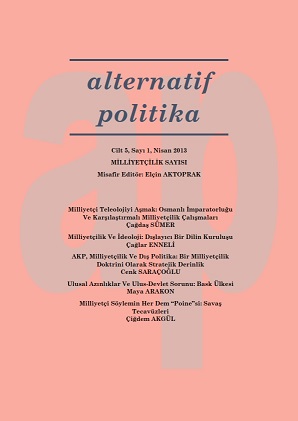Milliyetçi Teleolojiyi Aşmak: Osmanli Imparatorluğu Ve Karşilaştirmali Milliyetçilik Çalişmalari
Overcoming Nationalist Teleology: Ottoman Empire and Comparative Nationalism Studies
Author(s): Çağdaş SümerSubject(s): Political history, Social history, Nationalism Studies, The Ottoman Empire
Published by: Rasim Özgür DÖNMEZ
Keywords: Ottoman Empire; Nationalist movements; Nationalist historiography; Comparative historical analysis; Historical sociology;
Summary/Abstract: The Ottoman empire is a promising field in terms of the nationalist movements which appeared throughout the 19th and early 20th century. Although many monographies, which focus on the genesis of particular nationalist movements exist, there are very few studies analyzing those movements from a comparative perspective. This article will argue that this gap stems from the fact that nationalist teleology used to be a dominant paradigm in Ottoman historiography in general and nationalism studies in particular. This teleology, which depends on the idea that the dissolution of the Ottoman Empire into nation-states was an inevitable process, originates from three antecedents. The first factor is the nationalist historiographies which dominate the field both in Turkey and post-Ottoman states. The second, is the use of theories of nationalism by scholars in a way that reproduces this nationalist teleology. The final factor is the state-centered and teleological paradigms, which exist in Ottoman-Republican historiography. This article will argue that, by analyzing nationalist movements in the Ottoman empire comparatively, by reinstating them into a historical context and by elucidating the causal mechanisms behind these movements, we will be able to overcome this nationalist teleology.
Journal: Alternatif Politika
- Issue Year: 5/2013
- Issue No: 1
- Page Range: 1-27
- Page Count: 27
- Language: Turkish

